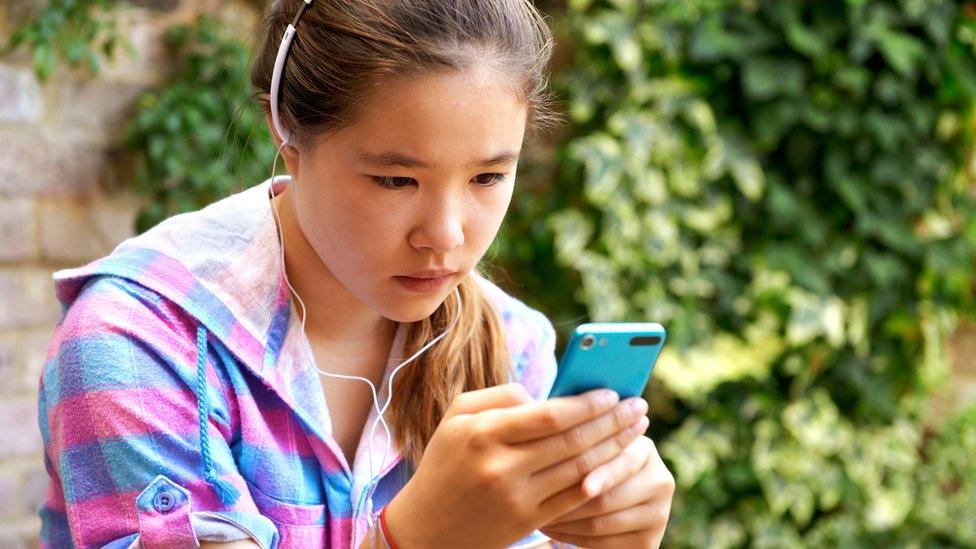Anti-Bullying Week: ‘United Against Bullying’
- Published

Anti-Bullying Week is organised by a group of charities dedicated to tackling bullying, called the Anti-Bullying Alliance.
Recently they surveyed 2,000 11 to 16-year-olds about their experience of bullying in the past 6 months and discovered that 34% of children in England reported that they had been a victim, with a big increase in online bullying.
According to Anti-Bullying Alliance - 38% of children were also anxious about returning to school in September, after lockdown.
This year your NHS rainbows in windows and clapping for carers has shown us how, more than ever, when people work together they can make a positive difference. So it may not surprise you that this year's Anti-Bullying Week theme is 'United Against Bullying'.
Martha Evans, Director of the Anti-Bullying Alliance told Newsround: "This year, Anti-Bullying Week is all about coming together. We wanted to show children and adults alike, that we all have a part to play and we can really make a difference if we Unite Against Bullying."
This year's theme was developed with over 300 young people who told the Anti-Bullying alliance they wanted a 'positive message of unity' in 2020.
What is bullying?
Bullying comes in many different forms, including mental, physical and emotional. It could be as simple as ignoring someone in your class just because everybody else does, posting mean comments about someone online, or sharing a joke at someone else's expense.
It's important to know some of the different ways bullying can take place, to help work together to stop it happening in schools and online.
Bullies can use any form of communication to make someone feel bad, here's a breakdown of the different kinds of digital bullying with links to advice from Own It:
Voice notes
Voice notes can be used to send mean recorded messages to other children. Because they are not written, and sometimes disappear in certain apps as soon as they are played, some people mistakenly think they don't 'count' as bullying. Sending a mean voice recording or note is just as serious as any other kind of bullying.
You can read more here about how some children have been bullied through voice notes and voice recordings on smart phones, and how to deal with it if it happens to you.
GIFS and emojis
GIFS can sometimes be cruel and be used to make fun of people, so be careful which ones you use . The same is true of emojis, because depending on how you use them you can make someone feel bad or hurt their feelings. It's always better to take a moment before sending that message to think 'will this upset someone?' or can it be taken negatively? You can also find out what emoji bullying is here.
Cyberbullying
Cyberbullying is the general term that covers all online bullying. Whether on social media, in the comments section of a forum, or in any online messages or posts. The internet is such a big part of our lives it can feel difficult to disconnect from it at times, and especially with smartphones, we carry the internet with us everywhere we go. If you are being bullied online there are things you can do, right now, to make it stop. Here are 7 fool-proof ways to beat cyber-bullying .
Being anonymous online can sometimes make it easier to be mean, here's how to understand the mind of an internet troll : The problem with being anonymous online.
And if you've ever wondered if something you've posted online is mean? Here's a quiz you can take to check for yourself .
Online Gaming
Online games can be fun, but when things get competitive sometimes people can cross the line into being cruel or abusive in the game. Have you ever seen bullying on online gaming? Here's how some pupils dealt with this
How can I play my part?
Anti-bullying week: 'A good friend won't go behind your back'
You can get involved and be 'United Against Bullying' by following this advice from the Anti-Bullying Alliance:
Include others: Make sure there is no one left by themselves in the playground, or ask others to play with you if they are feeling left out
Celebrate difference: Choosing to celebrate difference, rather than be divided by discrimination and hate. If someone is different to you get to know them better and you will find you have more in common than you might have thought
Keep your hands and feet to yourself: Never physically hurt anyone else
Respect everyone: Choose to be kind, not mean
Don't laugh at others: This can really hurt someone's feelings.
We all need to play our part! If everyone works together and agrees to act this way, we can make a more powerful difference.
If you are being bullied, or have been affected by bullying you can find advice help lines here.
Here are also the 5 things you can do right now.
- Published11 November 2019
- Published6 November 2023
- Published28 March 2014
